President-elect Donald Trump is seen at a meeting of technology leaders in the Trump Organization conference room at Trump Tower in New York City on December 14. Pool Photo by Albin Lohr-Jones/UPI |
License Photo
WASHINGTON, Jan. 9 (UPI) -- Make no mistake: President Donald Trump's political honeymoon will end just three days after he is inaugurated on Jan. 20, on his first working day. The reason is hidden in clear sight. Both domestic and international politics require confronting the nearly infinite inertia and resistance to change no matter how justified. In threatening or promising "to drain the swamp," i.e. to bring massive political change to Washington, Trump issued a challenge not only to the "system" but to the myriad entities that populate the system and will oppose him with the fiercest and often unfairest resistance possible.
Trump has two choices. He can sail his ship of state into these dangerous and treacherous iceberg-filled waters. Or, he can stay safely in port and use the safer but less courageous threat of action to achieve his agenda.
Consider some of the icebergs that impede him. The Trump administration and a partisan Republican Congress will quickly move to repeal the Affordable Health Care Act. This can be done by simple majority vote on the Hill followed by a presidential signature turning the bill into law.
The downside could become a political tsunami in the 2018 by-elections. Repeal without replacement could lead to chaos in the healthcare sector that accounts for about 1/6 of the U.S. GDP. Yet, the GOP seems determined to make good on this longstanding promise.
Among his many campaign commitments, the most prominent were to "make American great again" and "to build a wall and make Mexico pay for it." The first translates into both more jobs and better pay. That pledge cannot be finessed; building a wall can be.
Fundamental to making America great again is putting in place effective monetary and fiscal policies. The Federal Reserve has the sole responsibility for the former in setting interest rates. Congress controls the budget for the latter. Cutting taxes means increasing the deficit. That in turn means taking on the Tea Party and Freedom Caucus in the House who are dead set against adding to the already huge national debt.
In education, the Trump agenda faces daunting resistance from teachers' unions. Ditto for reforming the civil service and cutting government. Likewise, immigration reform demands bipartisan support. These too are huge icebergs lurking to hole the ship of state.
And more icebergs await in international waters. Trump has hinted at plans for an early meeting with Russian President Vladimir Putin, perhaps to strike a grand bargain. Syria, Ukraine, Europe and possibly large swaths of the Middle East are ingredients. The linchpin is defeating and destroying the Islamic State.
While few would disagree with the aim, the means of a deal with Russia are abhorrent to many, particularly in the Republican Party. Allegations of Russian hacking in our elections, so far dismissed by the president-elect, are taken very seriously by a majority of citizens and Congress. The annexation of Ukraine has been seen as ending the post-Cold War order and as a direct threat to NATO.
Trump has to square these circles and avoid these icebergs if he is to succeed and indeed if his administration is to stay afloat. Of course, many other hazards from North Korea's nuclear ballistic missile programs to China's militarization of the various islets in international waters are clear and present dangers. Whether or not the president-elect and his key advisers have recognized the enormity and complexity of these obstacles yet -- that hazard any and every administration -- at some point they must and will. One hopes it will not be too late.
A further warning to mariners: Every new administration stumbles, often badly. Kennedy suffered the Bay of Pigs and then the confrontation in Vienna with Soviet leader Nikita Khrushchev. George W. Bush was hit with September 11th. The new administration will be sorely and immediately tested at home and abroad, too.
Former Speaker of the House of Newt Gingrich offered sound and sobering advice when asked what worried him most about the new administration. He feared that the Trump team would lose heart. Put differently, "the shock and awe" of the reality of politics could be paralyzing.
A military aphorism is that God favors the larger battalions. In this case, Gingrich has it right. Damn the icebergs and full speed ahead might be the message. But make certain that damage control is a high priority because collisions are inevitable.
Harlan Ullman is UPI's Arnaud de Borchgrave Distinguished Columnist and a senior adviser at Washington D.C.'s Atlantic Council. His last book is "A Handful of Bullets: How the Murder of Archduke Franz Ferdinand Still Menaces the Peace." His next book, due out next year, is "Anatomy of Failure: Why America Loses Wars It Starts" that argues failure to know and to understand the circumstances in which force is used guarantees failure. Follow him on Twitter @brainsbasedstr1.















